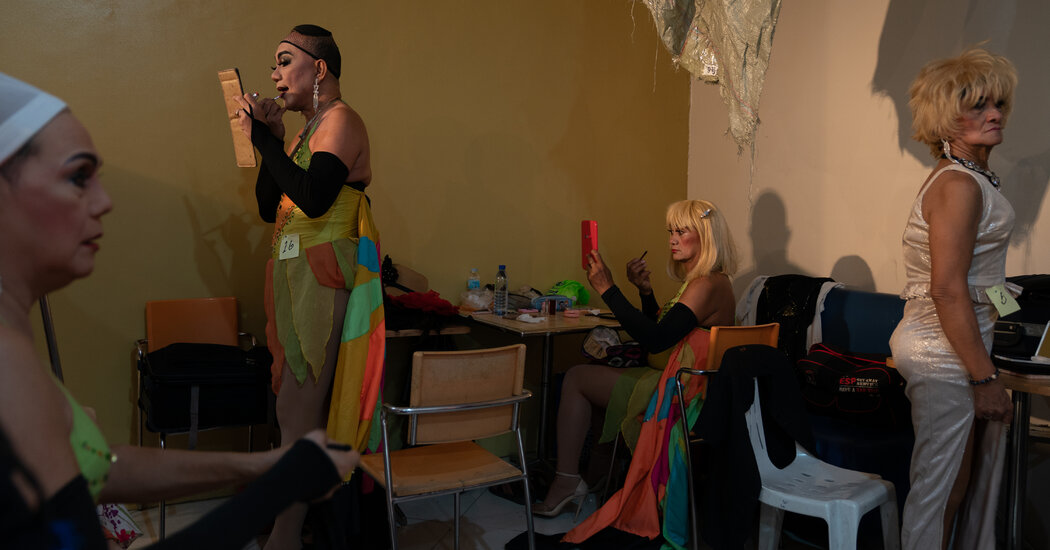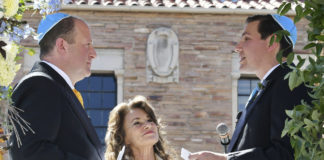
On weekdays in Manila, Al Enriquez, 86, pushes a rickety wooden cart with a rainbow umbrella perched on the dilapidated wood. He sells candies and cigarettes outside of a bustling commuter supermarket, where the occasional smoker or a child with a few coins stops by to make a purchase. In these dense, chaotic streets, Mr. Enriquez — swallowed by a T-shirt and basketball shorts hanging loosely on his small, aging body — is often overlooked by the crowd.
On weekends, though, he goes by the stage name Carmen de la Rue and is transformed into a Manila showgirl, donning floor length dresses, elaborate makeup, high heels and wigs.
Mr. Enriquez belongs to a community of older gay men that calls itself the Golden Gays. They have lived together for decades in the Philippines, hosting shows and pageant performances on the weekends to make ends meet.
The community was established in the 1970s by Justo Justo, a Manila city lawmaker, AIDS activist, and columnist. He opened his home to shelter the storied lolas, or grandmothers, an affectionate term the group has adopted to refer to its members.
When Mr. Justo founded the Golden Gays, he wanted to create a care home for gay men living on the streets of Manila, rejected by their families and society. The community evolved into a place where residents were also encouraged to embrace their gender identity. Some members, like Mr. Enriquez, embody both male and female personas. Others choose to maintain their feminine stage identities in their everyday lives.
Mr. Justo sheltered the Golden Gays in his own home until he died in 2012. Without Mr. Justo as a patron, the group, which now includes about 20 people, was back on the street. “Many had to go back to the street where they came from,” said Ramon Busa, the current president of the Golden Gays, who goes by Lola Mon or the stage name Monique de la Rue.
One of the members, Federico Ramasamy, better known as Lola Rica, found work as a street sweeper and was given a room in a shantytown. Lola Rica crammed her belongings and costumes in the small room and welcomed other Golden Gays who had nowhere else to go. Tragically, a fire burned down the apartment. Everyone was safe, but Lola Rica’s heels, gowns, wigs and photographs were lost.
“Time is limited. Our philosophy — because we are showgirls — is that the show must go on. The course of life must keep flowing,” said Lola Mon, 72.
It wasn’t until 2018 that the group finally earned enough money to rent a small house to share in Manila. “We see ourselves as orphans, though maybe it doesn’t apply to us, because we are old,” Lola Mon laughed. “We protect each one, because we have no caregivers to lean on.”
In the Philippines, there are few systems of support beyond the traditional family. More than half of citizens aged 60 and older live without a pension, which automatically classifies someone as living in poverty, according to government data. The country’s largely Catholic society has long discriminated against the L.G.B.T.Q. community, which means many of the Golden Gays were unable to find jobs when they were younger. Pensions were out of the question.
“They were thrown out of the house by the family of Justo, and I guess what sparked among the community through that kind of story is the shared experience of being disowned, of being thrown out of a home that you want for yourself,” said Mela Habijan, a pageant queen and L.G.B.T.Q. community organizer.
“That shared experience will always be the anchor” of the community, Ms. Habijan said. “We know what it’s like to be rejected. We know what it’s like to be disowned. We know the fear of being thrown out of our own homes.”
After they were evicted from Mr. Justo’s home, some members of the Golden Gays entered homeless shelters but said they felt unsafe in men’s dorms and uncomfortable with the expectation that they would perform religious rituals, as many shelters in the Philippines are run by faith-based organizations. In the absence of a traditional family structure, the Golden Gays have had to create their own support systems.
During the pandemic, the government prohibited older Filipinos, considered more vulnerable to Covid infection, from leaving their homes. The government also banned large gatherings to prevent further outbreaks, resulting in the Golden Gays suspending their performances.
“The fiestas were gone, there were no shows. The bars were closed. Where was money going to come from? Showgirls were the first to be battered by the pandemic,” said Robert Pangilinan, another member of the group, who goes by the stage name Odessa Jones.
The group survived the pandemic with donations from fans and supporters. “We were loved. The community did not abandon us,” said Odessa Jones, 55.
The home of the Golden Gays is painted green, the doorway trimmed with rainbow tassels welcoming those who enter. Photographs of shows adorn the walls. The residents share tasks like cleaning, cooking and caregiving. Becoming a resident is a very informal process that has changed over the years. People can be referred by other residents, and the doors are open to performers who are aging, who ask to join or are in need of shelter.
On a recent afternoon, laughter filled the house over the crackling of warm adobo in the kitchen. Mr. Enriquez held hands with Odessa Jones. A small marble urn sat on a shelf. It contains the ashes of Lola Rica, the resident who generously shared her apartment after the Golden Gays were kicked out of Mr. Justo’s home in 2021. Lola Rica passed away during the pandemic.
Because of Covid restrictions, the Golden Gays were unable to hold a proper funeral for Lola Rica. Someday, when they have extra cash, they dream of going to the seaside — perhaps on a holiday — dressed in black lace, and spreading Lola Rica’s ashes into the sea.
Now that Covid rules have been eased in the Philippines, the Golden Gays are back onstage. On a recent humid Sunday, in a modest Manila shopping mall, they prepared for a show, putting on elaborate makeup and glittering gowns. These days, those preparations require a little more effort. Mr. Enriquez is unable to bend down to put on high heels. Lola Mon sometimes needs support to climb onto the stage. A new generation — the Silver Gays — has become critical to the show.
Golden Gays performances are usually pageants during which each lola shows off a talent such as doing cartwheels in heels or lip-syncing. Mall-goers stop to catch a glimpse. Their eyes brighten. The shows are reminiscent of Philippine fiesta culture, where each neighborhood celebrates the feasts of a patron saint. “It is joyful,” Odessa Jones said. “I missed the applause and the cheers of people. I have boundless energy, because I want to show people that we are still alive.”
As the show ended that Sunday, the Golden Gays held hands as they sang “If We Hold on Together” by Diana Ross. After the show, they went home to celebrate their performance over beer. “Home is beautiful, because that is where there is complete love,” Lola Mon said. “Love revolves among ourselves. Our camaraderie is whole, and because we are together all the time, our companionship is solid.”







